Unit 1 What's the matter? Section B 1a~2e课件(共35张PPT) 人教版八年级下册英语
文档属性
| 名称 | Unit 1 What's the matter? Section B 1a~2e课件(共35张PPT) 人教版八年级下册英语 |
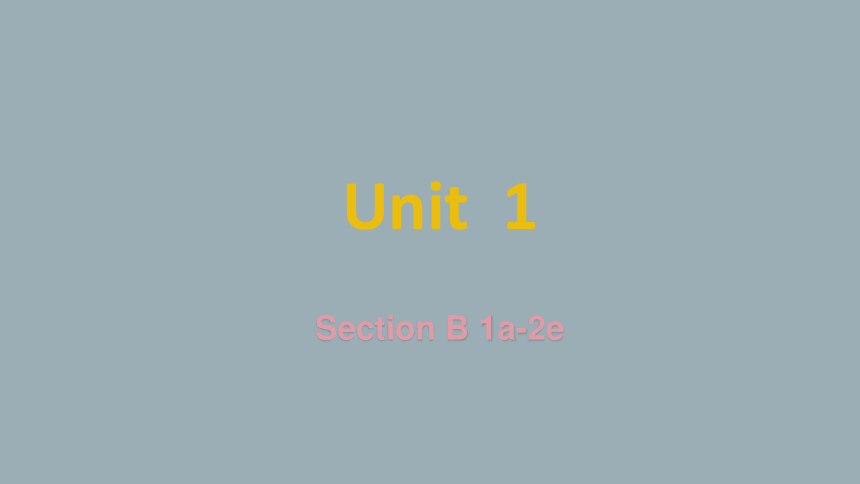
|
|
| 格式 | pptx | ||
| 文件大小 | 4.7MB | ||
| 资源类型 | 教案 | ||
| 版本资源 | 人教新目标(Go for it)版 | ||
| 科目 | 英语 | ||
| 更新时间 | 2024-11-10 19:22:33 | ||
图片预览

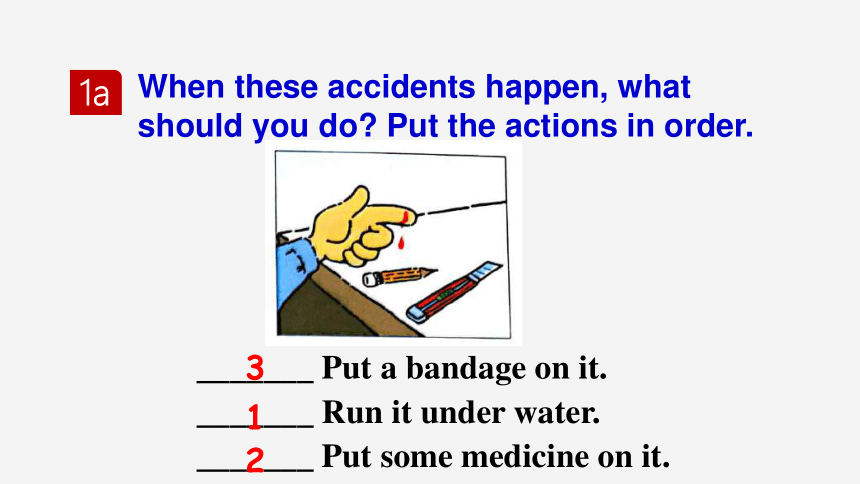
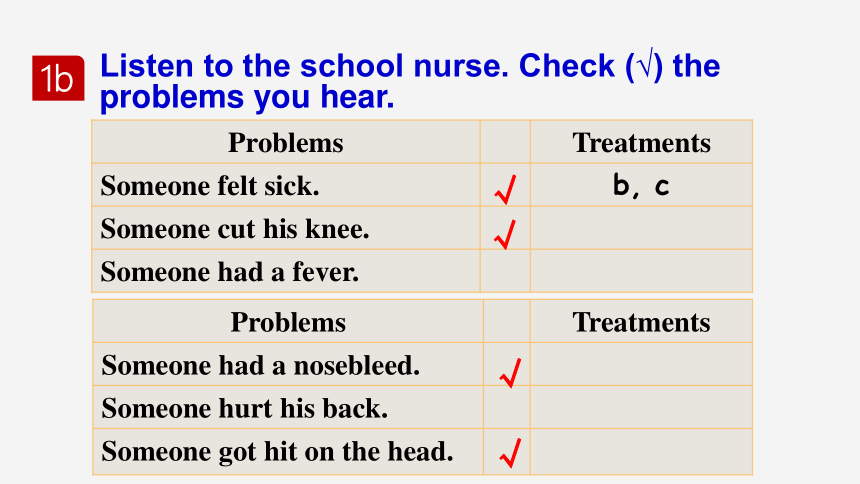
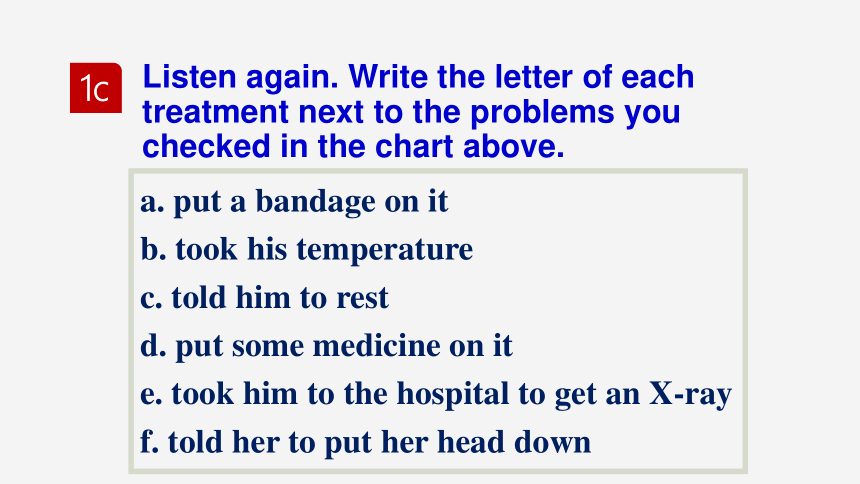
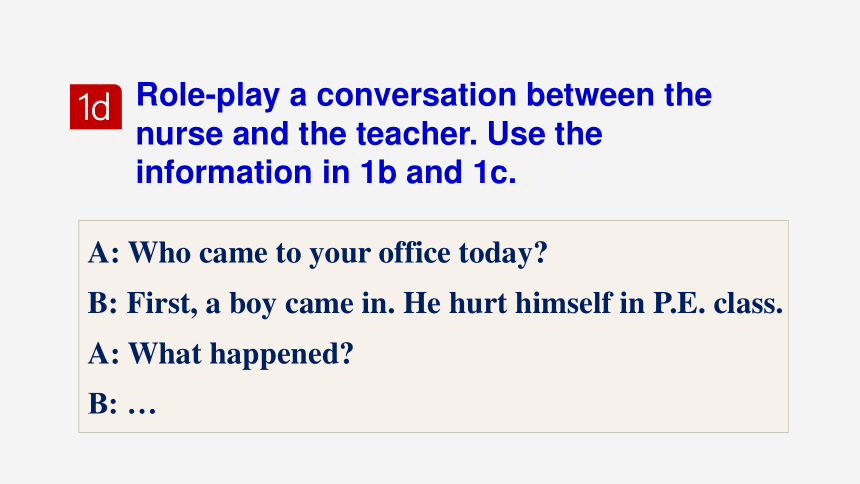
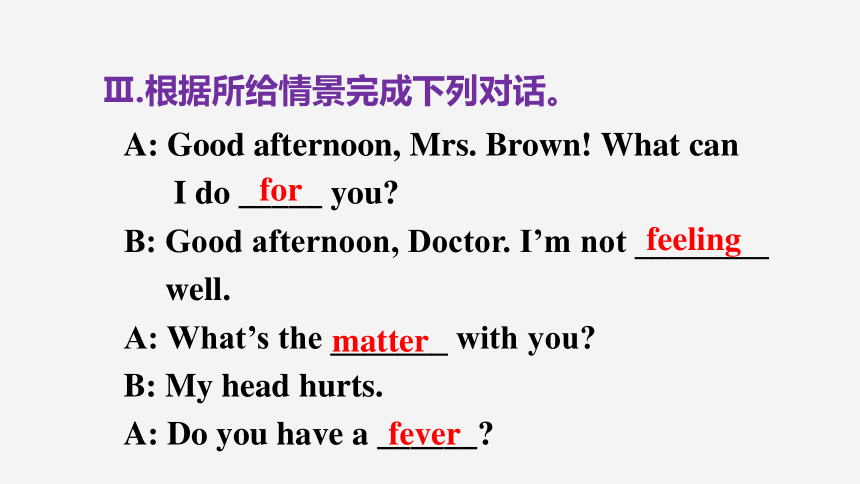
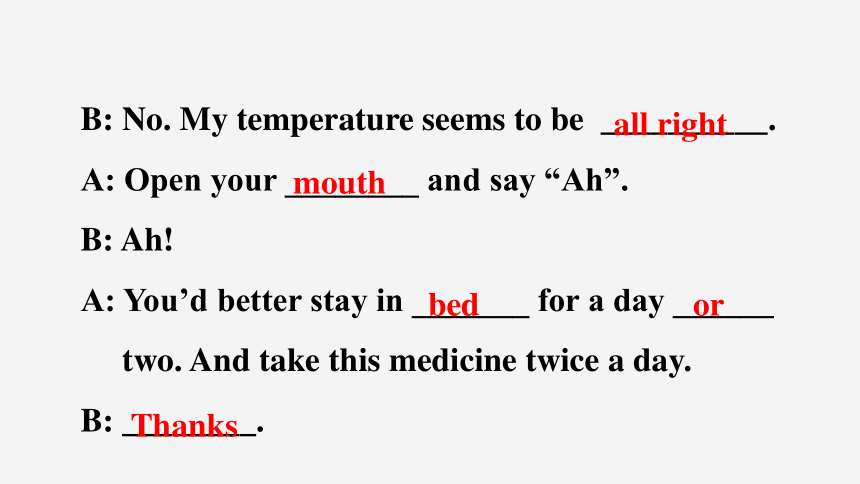
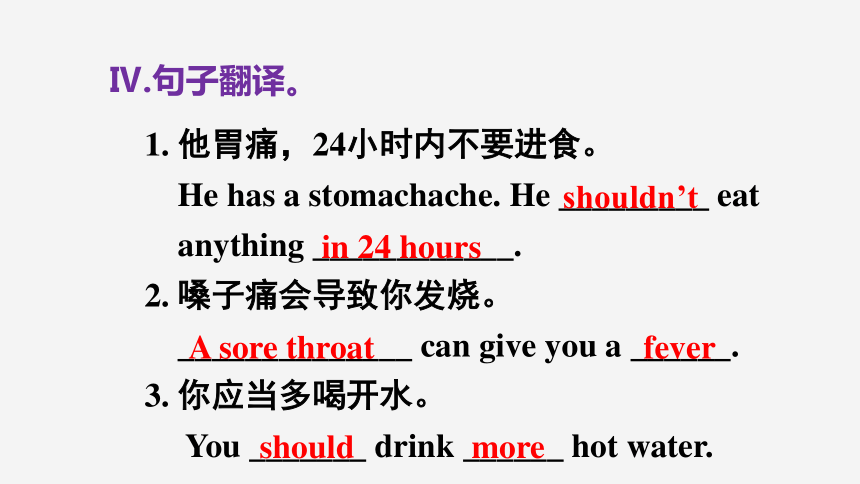
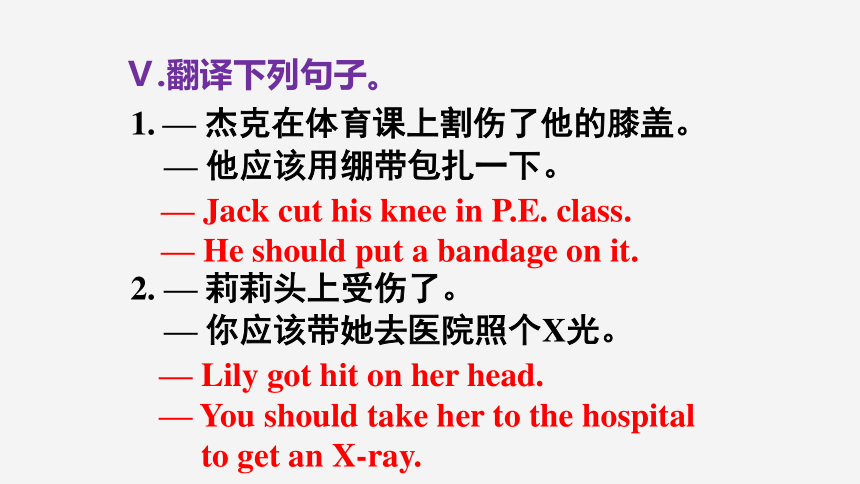
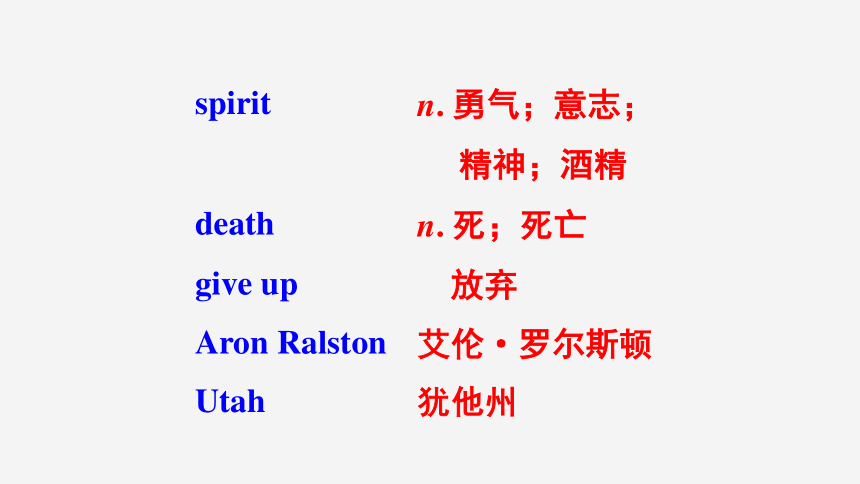
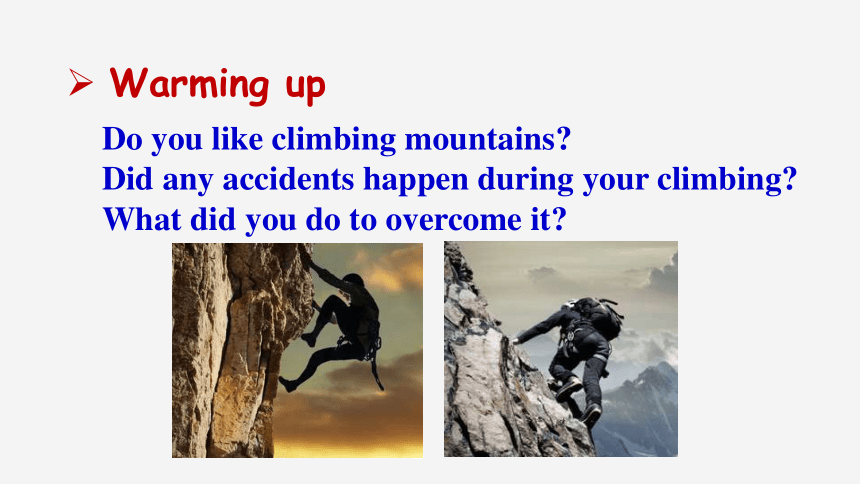

文档简介
(共35张PPT)
Unit 1
Section B 1a-2e
_______ Put a bandage on it.
_______ Run it under water.
_______ Put some medicine on it.
1
2
3
When these accidents happen, what should you do Put the actions in order.
1a
Listen to the school nurse. Check (√) the problems you hear.
Problems Treatments
Someone felt sick. b, c
Someone cut his knee.
Someone had a fever.
√
Problems Treatments
Someone had a nosebleed.
Someone hurt his back.
Someone got hit on the head.
√
√
√
1b
a. put a bandage on it
b. took his temperature
c. told him to rest
d. put some medicine on it
e. took him to the hospital to get an X-ray
f. told her to put her head down
Listen again. Write the letter of each treatment next to the problems you checked in the chart above.
1c
A: Who came to your office today
B: First, a boy came in. He hurt himself in P.E. class.
A: What happened
B: …
Role-play a conversation between the nurse and the teacher. Use the information in 1b and 1c.
1d
Ⅲ.根据所给情景完成下列对话。
A: Good afternoon, Mrs. Brown! What can
I do _____ you
B: Good afternoon, Doctor. I’m not ________
well.
A: What’s the _______ with you
B: My head hurts.
A: Do you have a ______
for
feeling
matter
fever
B: No. My temperature seems to be __________.
A: Open your ________ and say “Ah”.
B: Ah!
A: You’d better stay in _______ for a day ______
two. And take this medicine twice a day.
B: ________.
all right
mouth
bed
or
Thanks
1. 他胃痛,24小时内不要进食。
He has a stomachache. He _________ eat
anything ____________.
2. 嗓子痛会导致你发烧。
______________ can give you a ______.
3. 你应当多喝开水。
You _______ drink ______ hot water.
should more
shouldn’t
in 24 hours
Ⅳ.句子翻译。
A sore throat
fever
— 杰克在体育课上割伤了他的膝盖。
— 他应该用绷带包扎一下。
2. — 莉莉头上受伤了。
— 你应该带她去医院照个X光。
Ⅴ.翻译下列句子。
— Jack cut his knee in P.E. class.
— He should put a bandage on it.
— Lily got hit on her head.
— You should take her to the hospital
to get an X-ray.
n. 勇气;意志;
精神;酒精
n. 死;死亡
放弃
艾伦·罗尔斯顿
犹他州
spirit
death
give up
Aron Ralston Utah
Do you like climbing mountains
Did any accidents happen during your climbing
What did you do to overcome it
Warming up
Aron Ralston在2003年4月峡谷探险时遇到意外,右臂被夹在石缝中无法动弹,他只好借由身体的力量靠在峡谷岩壁上,这样支撑了5天之后,他突然想出了一个匪夷所思的办法,用小刀割断自己的手臂,
A= soccer
B= mountain climbing
C= swimming
Accidents or problems can sometimes happen when we do sports. Write the letter of each sport next to each accident or problem that can happen.
2a
Finding the Order of Events
Writers describe events in a certain order. Finding the order of the events will help you understand what you are reading.
Read the passage and underline the words you don’t know. Then look up the words in a dictionary and write down their meanings.
2b
Read the statements and circle True (T), False (F) or Don’t Know (DK).
1. Aron almost lost his life three times because of climbing accidents.
2. Aron had a serious accident in April 2003.
3. Aron ran out of water after three days.
4. Aron wrote his book before his serious accident.
5. Aron still goes mountain climbing.
DK
T
T
F
F
2c
Where did the accident happen on April 26, 2003
2. Why couldn’t Aron move
3. How did Aron free himself
4. What did Aron do after the accident
5. What does “between a rock and a hard place” mean
Read the passage again and answer the questions.
2d
1. Where did the accident happen on April 26, 2003
2. Why couldn’t Aron move
3. How did Aron free himself
In Utah.
Aron’s arm was caught under a 360-kilo rock that fell on him when he was climbing by himself in the mountains.
He used his knife to cut off half his right arm.
4. What did Aron do after the accident
5. What does “between a rock and a hard place” mean
After the accident, he wrote a book called Between a Rock and a Hard Place. And he kept on climbing mountains.
It means being in a difficult situation in which all of the choices are bad.
____ On April 26, 2003, he had a serious
mountain climbing accident.
____ Aron loves mountain climbing and
doesn’t mind taking risks.
1
2
Put the sentences in the correct order. Then use them to tell Aron’s story to your partner. Try to add other details from the reading.
2e
____ Aron did not give up after the accident
and keeps on climbing mountains today.
____ He wrote a book about his experience.
____ Aron lost half his right arm from the
2003 accident.
3
4
5
1. 观察下列句子。
1) He found himself in a very dangerous situation.
2) He was climbing by himself.
3) He bandaged himself so that he would not lose too
much blood.
4) We find ourselves “between a rock and a hard place”.
himself 和ourselves称为_____代词。
反身
Language points
第一人称 第二人称 第三人称
单数 myself himself herself itself
复数 yourselves
填写下列表格。
yourself
ourselves
themselves
2. Aron is used to taking risks.
be used to 意为“习惯于”,其中to是介词,其后要接名词或V-ing形式。
He is used to walking to school.
他习惯步行上学。
used to do sth. “过去常常做某事”
I used to live in London.
我过去一直住在伦敦。
3. After losing his arm, he wrote a book called Between a Rock and a Hard Place. 失去手臂之后, 他写了一本名为《生死两难》的书。
“Between a Rock and a Hard Place 是一本书的书名, 可译作《生死两难》。其本身是英语中的一个固定习语,表示在艰难或危险的处境下“从两难中进行选择”, 意为“ 左右为难;进退两难”。
如:
Who will you save when your mother and your wife fall into the water For many people, it’s between a rock and a hard place.
当你的母亲和妻子同时落水时,你会救谁?
对很多人说,这是一个两难的问题。
4. This means being in a difficult situation that
you cannot seem to get out of.
它意思是“处于一个你似乎无法摆脱的困境中”。
1)此处mean 表示“……意思是;意为”,用来解释上句出现在书名中的习语的意思。如:
What do you mean 你的意思是什么?
此外,mean 还可以表示“意味着”的意思。如:
…before we have to make a decision that could mean life or death.
在我们不得不做出可能意味着生死的决定之前……
2)a difficult situation that you cannot seem to get out of 和a decision that could mean life or death 均为定语从句。
在前者中,从句that you cannot seem to get out of 修饰名词 situation;
在后者中,从句that could mean life or death 修饰decision。
5. His love for mountain climbing is so great that he kept on climbing mountains even after this experience.
so...that... 表示“如此/这么……以致于……”,“ 常引导结果状语从句。其中so是副词,常可用来修饰形容词或副词。
他太小了而无法照顾好自己。
He is so young that he can’t look after himself well.
6. 观察以下两个句子,总结 so that, 和 so...that 的用法。
1) He bandaged himself so that he would not lose too much blood.
2) His love for mountain climbing is so great that he kept on climbing mountains even after this experience.
so that 既可引导目的状语从句又可引导结果状语从句。引导目的状语从句时可译为“为了”,引导结果状语从句时可译为“以便”。如:
I speak loudly so that all the students can hear me clearly. (目的状语从句)
Maria likes the woolen dress so that she decides to buy it immediately. (结果状语从句)
so... that...中的so是副词,常用来修饰形容词或副词,“如此……以致于……”。
主语 + 谓语 + so + adj. / adv. + that从句。
e.g. The boy ran so fast that I couldn’t catch him.
so + adj. + a(n) + 单数名词 + that从句。
e.g. It was so fine a day yesterday that we all
went out for a picnic.
昨天天气很好,我们都出去野餐了。
e.g.
He worked hard at his lessons so that he could gain high grades in the exams.
他努力学习,争取考试能获得好成绩。
He worked hard at his lessons, so that he gained high grades in the exams.
他努力学习,结果考试获得了好成绩。
1. What’s the matter ______ you
A. for B. with C. to
2. Your body temperature is 39 ℃. You ______.
A. have a cold B. have a headache
C. have a fever
3. I have a toothache. I should _________.
A. see the dentist B. drink more water
C. lie down and rest
B
C
A
Ⅱ. 单项选择。
5. Eating too _______ is bad for your health.
A. many B. less C. much
6. Bill should ________ because he is very thirsty.
A. go to bed B. eat food C. drink water
C
C
Unit 1
Section B 1a-2e
_______ Put a bandage on it.
_______ Run it under water.
_______ Put some medicine on it.
1
2
3
When these accidents happen, what should you do Put the actions in order.
1a
Listen to the school nurse. Check (√) the problems you hear.
Problems Treatments
Someone felt sick. b, c
Someone cut his knee.
Someone had a fever.
√
Problems Treatments
Someone had a nosebleed.
Someone hurt his back.
Someone got hit on the head.
√
√
√
1b
a. put a bandage on it
b. took his temperature
c. told him to rest
d. put some medicine on it
e. took him to the hospital to get an X-ray
f. told her to put her head down
Listen again. Write the letter of each treatment next to the problems you checked in the chart above.
1c
A: Who came to your office today
B: First, a boy came in. He hurt himself in P.E. class.
A: What happened
B: …
Role-play a conversation between the nurse and the teacher. Use the information in 1b and 1c.
1d
Ⅲ.根据所给情景完成下列对话。
A: Good afternoon, Mrs. Brown! What can
I do _____ you
B: Good afternoon, Doctor. I’m not ________
well.
A: What’s the _______ with you
B: My head hurts.
A: Do you have a ______
for
feeling
matter
fever
B: No. My temperature seems to be __________.
A: Open your ________ and say “Ah”.
B: Ah!
A: You’d better stay in _______ for a day ______
two. And take this medicine twice a day.
B: ________.
all right
mouth
bed
or
Thanks
1. 他胃痛,24小时内不要进食。
He has a stomachache. He _________ eat
anything ____________.
2. 嗓子痛会导致你发烧。
______________ can give you a ______.
3. 你应当多喝开水。
You _______ drink ______ hot water.
should more
shouldn’t
in 24 hours
Ⅳ.句子翻译。
A sore throat
fever
— 杰克在体育课上割伤了他的膝盖。
— 他应该用绷带包扎一下。
2. — 莉莉头上受伤了。
— 你应该带她去医院照个X光。
Ⅴ.翻译下列句子。
— Jack cut his knee in P.E. class.
— He should put a bandage on it.
— Lily got hit on her head.
— You should take her to the hospital
to get an X-ray.
n. 勇气;意志;
精神;酒精
n. 死;死亡
放弃
艾伦·罗尔斯顿
犹他州
spirit
death
give up
Aron Ralston Utah
Do you like climbing mountains
Did any accidents happen during your climbing
What did you do to overcome it
Warming up
Aron Ralston在2003年4月峡谷探险时遇到意外,右臂被夹在石缝中无法动弹,他只好借由身体的力量靠在峡谷岩壁上,这样支撑了5天之后,他突然想出了一个匪夷所思的办法,用小刀割断自己的手臂,
A= soccer
B= mountain climbing
C= swimming
Accidents or problems can sometimes happen when we do sports. Write the letter of each sport next to each accident or problem that can happen.
2a
Finding the Order of Events
Writers describe events in a certain order. Finding the order of the events will help you understand what you are reading.
Read the passage and underline the words you don’t know. Then look up the words in a dictionary and write down their meanings.
2b
Read the statements and circle True (T), False (F) or Don’t Know (DK).
1. Aron almost lost his life three times because of climbing accidents.
2. Aron had a serious accident in April 2003.
3. Aron ran out of water after three days.
4. Aron wrote his book before his serious accident.
5. Aron still goes mountain climbing.
DK
T
T
F
F
2c
Where did the accident happen on April 26, 2003
2. Why couldn’t Aron move
3. How did Aron free himself
4. What did Aron do after the accident
5. What does “between a rock and a hard place” mean
Read the passage again and answer the questions.
2d
1. Where did the accident happen on April 26, 2003
2. Why couldn’t Aron move
3. How did Aron free himself
In Utah.
Aron’s arm was caught under a 360-kilo rock that fell on him when he was climbing by himself in the mountains.
He used his knife to cut off half his right arm.
4. What did Aron do after the accident
5. What does “between a rock and a hard place” mean
After the accident, he wrote a book called Between a Rock and a Hard Place. And he kept on climbing mountains.
It means being in a difficult situation in which all of the choices are bad.
____ On April 26, 2003, he had a serious
mountain climbing accident.
____ Aron loves mountain climbing and
doesn’t mind taking risks.
1
2
Put the sentences in the correct order. Then use them to tell Aron’s story to your partner. Try to add other details from the reading.
2e
____ Aron did not give up after the accident
and keeps on climbing mountains today.
____ He wrote a book about his experience.
____ Aron lost half his right arm from the
2003 accident.
3
4
5
1. 观察下列句子。
1) He found himself in a very dangerous situation.
2) He was climbing by himself.
3) He bandaged himself so that he would not lose too
much blood.
4) We find ourselves “between a rock and a hard place”.
himself 和ourselves称为_____代词。
反身
Language points
第一人称 第二人称 第三人称
单数 myself himself herself itself
复数 yourselves
填写下列表格。
yourself
ourselves
themselves
2. Aron is used to taking risks.
be used to 意为“习惯于”,其中to是介词,其后要接名词或V-ing形式。
He is used to walking to school.
他习惯步行上学。
used to do sth. “过去常常做某事”
I used to live in London.
我过去一直住在伦敦。
3. After losing his arm, he wrote a book called Between a Rock and a Hard Place. 失去手臂之后, 他写了一本名为《生死两难》的书。
“Between a Rock and a Hard Place 是一本书的书名, 可译作《生死两难》。其本身是英语中的一个固定习语,表示在艰难或危险的处境下“从两难中进行选择”, 意为“ 左右为难;进退两难”。
如:
Who will you save when your mother and your wife fall into the water For many people, it’s between a rock and a hard place.
当你的母亲和妻子同时落水时,你会救谁?
对很多人说,这是一个两难的问题。
4. This means being in a difficult situation that
you cannot seem to get out of.
它意思是“处于一个你似乎无法摆脱的困境中”。
1)此处mean 表示“……意思是;意为”,用来解释上句出现在书名中的习语的意思。如:
What do you mean 你的意思是什么?
此外,mean 还可以表示“意味着”的意思。如:
…before we have to make a decision that could mean life or death.
在我们不得不做出可能意味着生死的决定之前……
2)a difficult situation that you cannot seem to get out of 和a decision that could mean life or death 均为定语从句。
在前者中,从句that you cannot seem to get out of 修饰名词 situation;
在后者中,从句that could mean life or death 修饰decision。
5. His love for mountain climbing is so great that he kept on climbing mountains even after this experience.
so...that... 表示“如此/这么……以致于……”,“ 常引导结果状语从句。其中so是副词,常可用来修饰形容词或副词。
他太小了而无法照顾好自己。
He is so young that he can’t look after himself well.
6. 观察以下两个句子,总结 so that, 和 so...that 的用法。
1) He bandaged himself so that he would not lose too much blood.
2) His love for mountain climbing is so great that he kept on climbing mountains even after this experience.
so that 既可引导目的状语从句又可引导结果状语从句。引导目的状语从句时可译为“为了”,引导结果状语从句时可译为“以便”。如:
I speak loudly so that all the students can hear me clearly. (目的状语从句)
Maria likes the woolen dress so that she decides to buy it immediately. (结果状语从句)
so... that...中的so是副词,常用来修饰形容词或副词,“如此……以致于……”。
主语 + 谓语 + so + adj. / adv. + that从句。
e.g. The boy ran so fast that I couldn’t catch him.
so + adj. + a(n) + 单数名词 + that从句。
e.g. It was so fine a day yesterday that we all
went out for a picnic.
昨天天气很好,我们都出去野餐了。
e.g.
He worked hard at his lessons so that he could gain high grades in the exams.
他努力学习,争取考试能获得好成绩。
He worked hard at his lessons, so that he gained high grades in the exams.
他努力学习,结果考试获得了好成绩。
1. What’s the matter ______ you
A. for B. with C. to
2. Your body temperature is 39 ℃. You ______.
A. have a cold B. have a headache
C. have a fever
3. I have a toothache. I should _________.
A. see the dentist B. drink more water
C. lie down and rest
B
C
A
Ⅱ. 单项选择。
5. Eating too _______ is bad for your health.
A. many B. less C. much
6. Bill should ________ because he is very thirsty.
A. go to bed B. eat food C. drink water
C
C
同课章节目录
- Unit 1 What's the matter?
- Section A
- Section B
- Unit 2 I'll help to clean up the city parks.
- Section A
- Section B
- Unit 3 Could you please clean your room?
- Section A
- Section B
- Unit 4 Why don't you talk to your parents?
- Section A
- Section B
- Unit 5 What were you doing when the rainstorm came
- Section A
- Section B
- Review of Units 1-5
- Unit 6 An old man tried to move the mountains.
- Section A
- Section B
- Unit 7 What's the highest mountain in the world?
- Section A
- Section B
- Unit 8 Have you read Treasure Island yet?
- Section A
- Section B
- Unit 9 Have you ever been to a museum?
- Section A
- Section B
- Unit 10 I've had this bike for three years.
- Section A
- Section B
